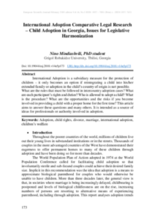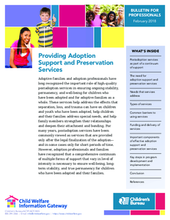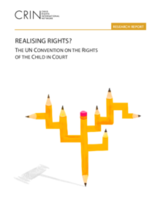Displaying 271 - 280 of 622
This article aims to international adoption in Georgia. It is intended as a source of ideas for professionals or authority involved in adoption.
This bulletin draws from available literature and practice knowledge to summarize key issues related to providing effective services to support the stability and permanency of adoptions.
In the current study the authors examined associations between children's pre-adoption experiences (type of pre-adoption care and early deprivation) and their adaptive and maladaptive behavioral adjustment.
This study evaluates the ‘Nurturing Attachment’ program in the UK, a Dyadic Developmental Psychotherapy intervention for adoptive families.
In this study, the authors examined the process of how relationships are built between Ethiopia adoptees and their adoptive families within the new family setting.
The present study concerning domestic adoption explored the adjustment of 37 adolescents and 22 emerging adults (with age ranging between 11 and 18 and 18 and 24 years, respectively), adopted through an Italian form of open adoption, and analyzed the quality of adoptive family relationships and adoptees' attachment as possible moderating variables in the relation between multiple pre-adoptive risk factors and adoptees' outcomes.
The present study examined whether the prospective association between cumulative pre-adoptive risk (e.g., maltreatment, age at placement, foster placement instability, ever having lived with birth parent) and adolescent/young-adult substance use was mediated by childhood internalizing and externalizing problems in youth adopted from foster care.
This report by the Child Rights International Network (CRIN) draws out the ways the Convention on the Rights of the Child (CRC) has been used around the world to challenge abuses of children’s rights, but also where it has been misunderstood and misapplied by national courts.
Esta nueva publicación del SSI sobre los fracasos de la adopción internacional tiene como objetivo acompañar y equipar a los profesionales de las Autoridades centrales y competentes y de los Organismos acreditados para la adopción, las personas adoptadas y los padres adoptivos, para prevenir mejor y manejar las crisis o los fracasos que las familias adoptivas pueden atravesar.
This Note from The Hague Conference on Private International Law aims to promote the proper interpretation and application of Article 2 of the Hague Convention of 29 May 1993 on Protection of Children and Co-operation in Respect of Intercountry Adoption (“1993 Hague Convention” or “Convention”).





